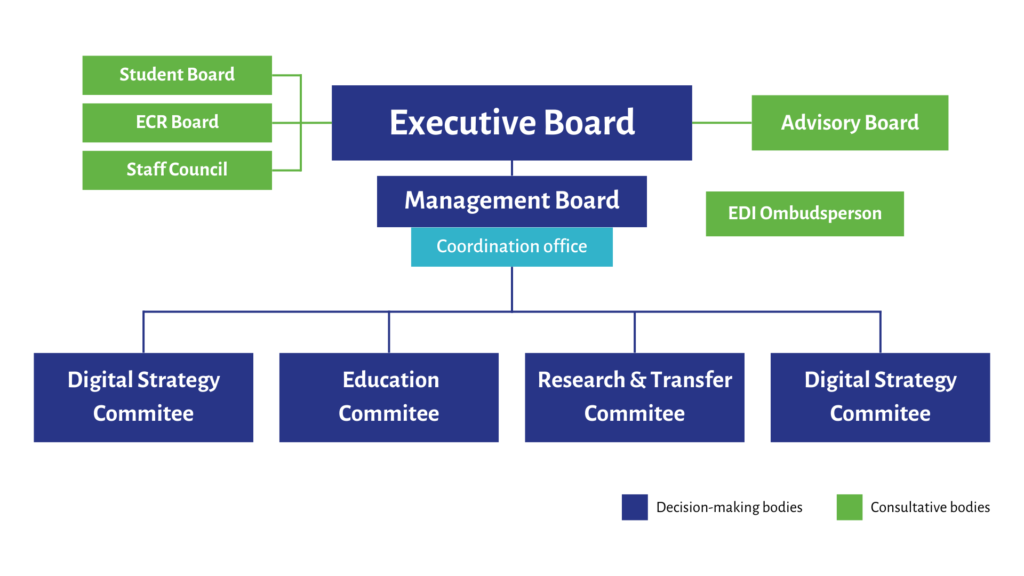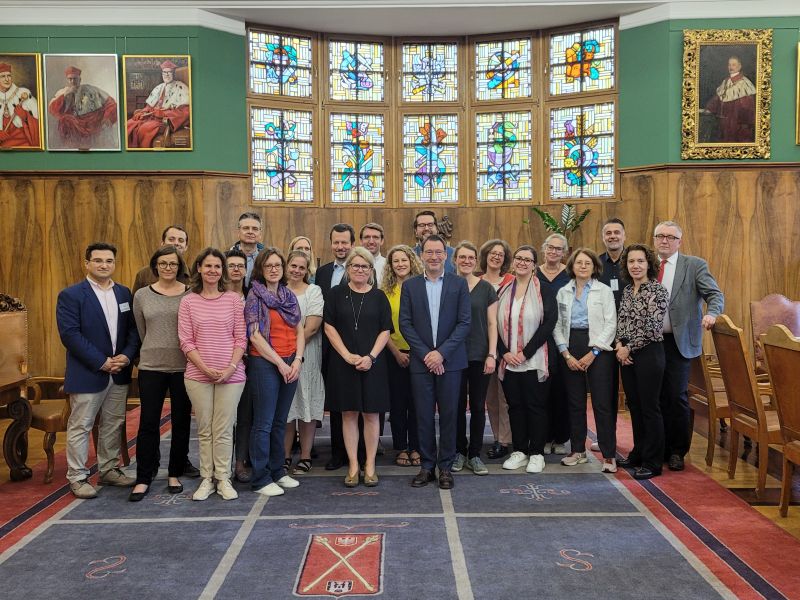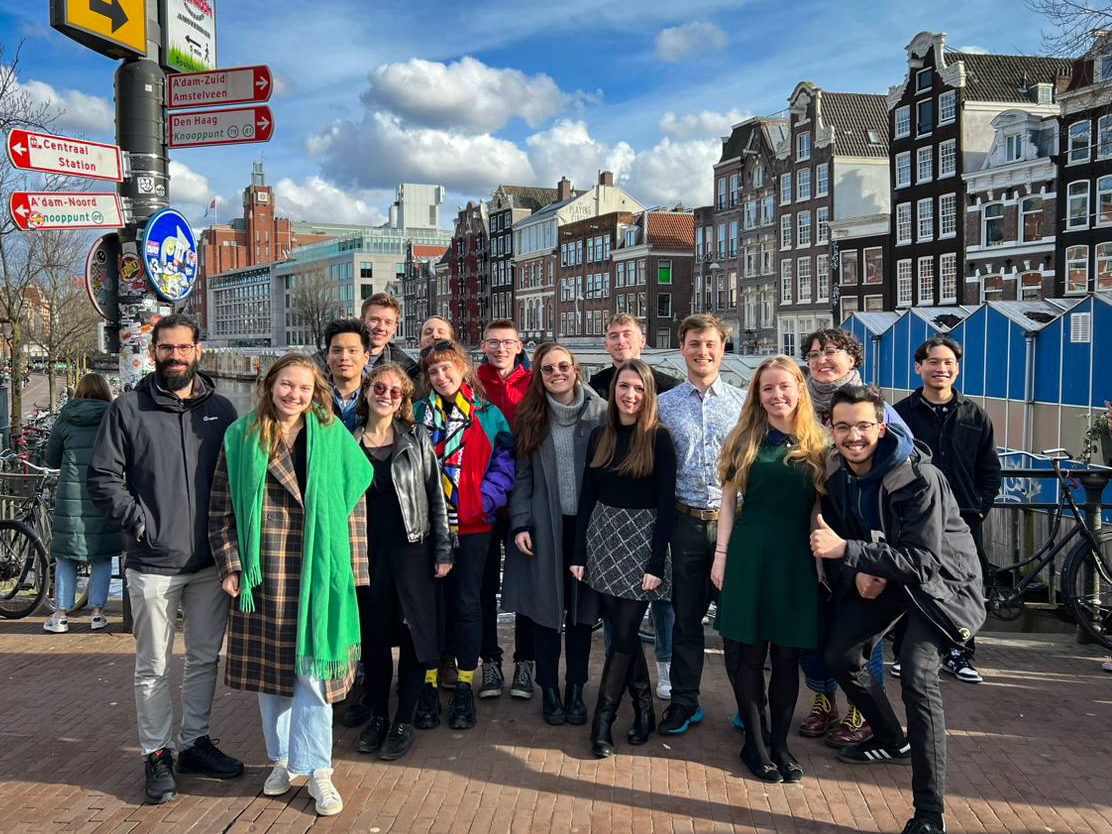The EPICUR federal governance architecture has been designed to address 3 key challenges and achieve the very ambition of the European University initiative:
- The EPICUR core governance structure must thrive beyond any specifically funded projects. Currently, activities are funded through two European funded projects. From phase 2 onwards, the EPICUR governance must be able to launch and monitor new funded projects and to ensure overall strategic coherence and synergies.
- Integrate EPICUR governance into each members’ internal governance. The deep level of cooperation across all university missions and the increased number of shared activities and resources require both stronger institutional coordination among our members’ governance and a decentralised decision-making in certain domains to the most competent senior management, with clear institutional authority and expertise.
- Facilitate community participation and institutional engagement by developing a whole-of-institution approaches. A participatory governance is key to ensure a true integration and sustain a thriving community across national, linguistic and disciplinary boundaries, united around European values, the challenges pertaining to EDI and a shared sense of belonging.

The EPICUR governance architecture will therefore rely on a set 5 key principles:
- Agility, through lean decision-making processes and clear division of labour for strategic and operational decisions
- Inclusiveness, entrusting decision-making competences for all relevant stakeholders (students, academics and staff) to able to engage and provide significant input
- Efficiency, with regular evaluations of implemented measures, tasks and management to ensure that the needs of all stakeholders are met
- Transparency, to ensure that decision process is clear and information is accessible to relevant stakeholders
- Consent, with efficient coordination processes to ensure that decision-making bodies agree by consent
Executive Board

Members
Full members:
- 9 Rectors / Presidents or
Vice-Rectors / Vice-
Presidents - Strategic Coordinator
Advisory members:
- 2 students
representatives elected
by the Student Board - 2 ECR representatives
elected by the ECR
Board - 2 staff representatives
elected by the Staff
Council
Observer:
- Alliance Manager
Missions
- Alliance strategic directions
and oversight - High-level representation of
the alliance - Liaison with the Advisory
Board
Decisions
- Validation of alliance
policies - Validation of alliance
concepts - Final deliverable validation
Management Board

This picture’s purpose is only to illustrate and does not exactly represent the Management Board and its members
Members
- 9 Vice-rectors / vicepresidents
EPICUR or a
senior director of
international relations - Strategic Coordinator
Advisory members: - 2 students
- Alliance Manager
Missions
- Ensure the strategic full
participation and
involvement of faculties,
departments, and services
within EPICUR - Discussion of strategic
alliance management - Discussion of governance
issues and cross-cutting
policies and issues - Monitoring of milestones
- Representation of the
alliance - Preparation of new projects
and funding applications
Decisions
- Validation of preparatory
documents and strategic
papers for the Executive
Board and the Advisory
Board - Strategic alliance
management decisions,
e.g. on external
communication - Validation of milestones
- Validation of
communication strategy
Advisory Board
Members
- 2 external academics
- 2 business / industry actors
- 2 civil society actors
- 2 public sector actors
- 9 Rectors / Presidents
Observers:
- Strategic Coordinator
- Alliance Manager
- Governance policy officer
member of the
Coordination Office
Mission
- Discussion of alliance
policies - Discussion of alliance
concepts - Discussion of milestones
and deliverables
Decisions
- Validation of preparatory
documents and strategic
papers for the Executive
Board and the Advisory
Board - Strategic alliance
management decisions,
e.g. on external
communication - Validation of milestones
- Validation of
communication strategy
Student Board

Missions
The EPICUR Student Board was created in March 2020. Since the pilot phase, the Student Board fulfill the following tasks:
- Take part in all working group meetings of the alliance incl. voting rights in thematical coomittees
- Liaise with students and enhance EPICUR’s student-to-student dissemination
- Provide feedback on EPICUR’s working documents and meetings
- Update its internal charter as according to their needs.
Since November 2021, the Student Board has established its own Student Board Charter with clear voting procedures and its own Executive Board. The Executive Board consists of a Chair, a Deputy Chair, a Secretary and a Communication Officer. It should represent at least 3 universities and at least 2 genders.
Regarding the selection process, each university decided on its own how to appoint the students given the heterogeneity of the universities’ structures. The selection modes vary between an appointment of central student organisation representatives, call for application or active remuneration of students as parts of the local Project Implementation Teams. Within EPICUR-SHAPE-IT, the EPICUR Steering Committee has accepted to provide voting rights to the Student Board in all thematical committees, which could significantly strengthen Student involvement and which could create room for Student focus group to provide input that is even more direct. EPICUR welcomes and supports active student involvement and keeps reflecting and exploring ways to involve them even further in the activities of the EPICUR Alliance. Furthermore, the Student Board meets 3x a year on-site to assure fruitful cooperation between them.
Get involved!
If you are a student at one of the partner universities and want to be involved in the Student Board, or if you just want more information about the Student led activities, please feel free to contact us!
ECR-Board

Missions
- Providing constructive input and feedback to the EPICUR-Research team on planned and already implemented project activities
- Participating in the dissemination of the project on a local and regional level
- Representing the interests of Early Career Researchers from the EPICUR universities
Within the EPICUR alliance, they form a quality network and strengthen links on a personal and professional level, thus achieving greater cohesion and understanding, regardless of borders.
Check out our ECR-Board page for more.




